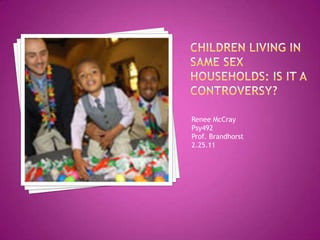
Same sex couple adoption
- 1. Children Living In Same Sex Households: Is It A Controversy? Renee McCray Psy492 Prof. Brandhorst 2.25.11
- 2. Hypothesis The hypothesis for this paper is whether or not a child adopted by same sex couples would be the same compared to if a heterosexual couple who adopts a child? A lot of individuals would like to know if there is a difference based off on the way the child that has been adopted by either couple would have any kind of significant outlook on the child’s well being. For example, the child adopted by a same-sex couple, would he or she succeed in life with the love and the support that he or she needs versus the child growing up in a heterosexual couple household? That is why the research on this information is needed in order to see if there is a difference or not.
- 3. Purpose of paper This research paper is going to focus on children residing in same-sex households. There has been numerous research conducted upon this situation in regards to the parenting skills of same-sex couples compared to heterosexual couples. According to the notes (Argosy, 2011) it indicates that “ in order to support the ethical practice of psychology, there is no choice but to ensure the research studies are generalizable to all people regardless of ethnicity and age.” It doesn’t matter what color you are, every person should be able to raise a child regardless of their sexual preference. This paper will focus on the outlooks of why the research is being conducted, and the implications that this study will have on those that do not understand what these individuals go through.
- 4. What is the main purpose of this paper This paper will reach out to those that have issues with people who are in a same-sex relationship and recognizes the struggles that they endure while raising a child. The efforts that they make to make sure that their children are not being criticized or taunted with negative inputs from those that do not understand or believe in homosexuals raising children is the one detrimental effects that they have to endure. This paper is designed to educate individuals who are blind to the fact that there are same-sex couples who want to adopt children, but have a hard time doing so, due to the ways others feel about the situation. There is numerous research done on how kids are treated and how the individuals that are in same-sex relationships are teaching the children to not be ashamed of their parents lifestyle, in accordance to being who they are and not worrying about what other people think or feel about the situation.
- 5. Flaws in this research The flaws in the design is whether the child feels more comfortable with having two mothers or two fathers. This could be seen as a 2x2 factorial which is a design that compares one subject to another subject. For examples, some children will feel more comfortable with two mothers rather than having two fathers, because women can provide the emotional support, caring, and nurturing role. This is something that every child yearns for, however, the fathers can teach tough love, discipline, as well as protecting one’s self.
- 6. conclusion In regards to the implications of the findings, I feel that there is no significant impact in regards to how these children are being raised. As with any parent, gay or straight, they want to be able to make sure that there is balance in that child’s life. By doing this, the parent gives the child love, support, nurture, as well as establishing communication, just in case there is something that could possibly disturb the child. With all the children that are involved in foster homes, or group homes, waiting to be adopted, why not let same-sex couples adopt. There’s nothing wrong with two individuals that love one another, gay or straight, that should be a damper on why they are not allowed to adopt a child. Even when some people think that it is unethical and morally wrong, who are we to judge how those people will do as parents in reference to raising a child. The world need to wake up and stop being so oblivious towards those that want to be a role model or a positive person in that child’s life and let them have a chance to teach that child how to ignore the ignorance bliss that continues on around the world.
- 7. references Argosy University Module 3 Lecture Notes (2010) Retrieved on 8.20.10 from http://myeclassonline.com/re/DotNextLaunch.asp?CourseID=4280608 Argosy University Module 6 Lecture Notes (2010) retrieved on 8.20.10 from http://myeclassonline.com/re/DotNextLaunch.asp?Courseid=4280608 Argosy University Module 7 Lecture Notes (2010) retrieved on 8.20.10 from http://myeclassonline.com/re/DotNextLaunch.asp?Courseid=4280608 Crawford, Jill M. (1999) “Co-parent Adoptions by Same Sex Couples From Loophole to Law” Families in Society New York. Retrieved 7.6.10 from http://wfxsearch.webfeat.org/wfsearch/search Rimalower, Lucy, and Caty, Caren. (2009) “The mamas and papas: the invisible diversity of families with same-sex parents in The United States.” Sex Education Vol. 9 Issue 1. P.17-32